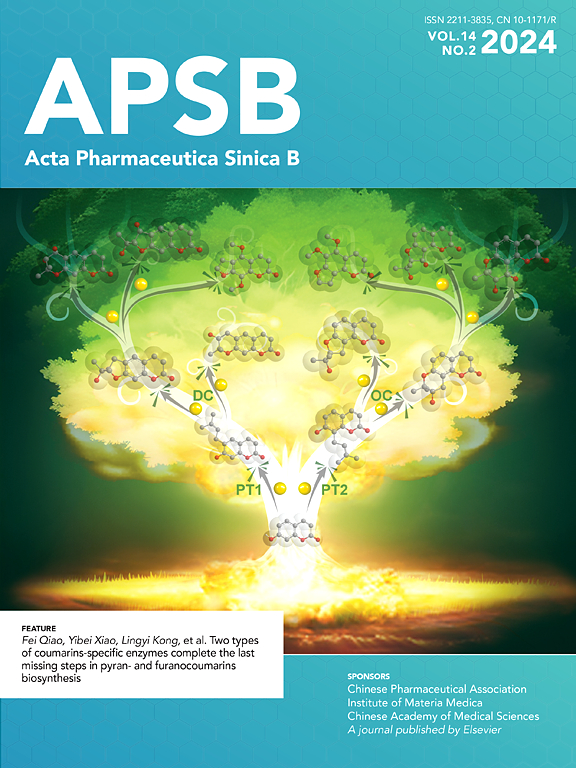The ubiquitin–proteasome system: A potential target for the MASLD
IF 14.7
1区 医学
Q1 PHARMACOLOGY & PHARMACY
引用次数: 0
Abstract
Metabolic dysfunction-associated steatotic liver disease (MASLD), the most prevalent chronic liver condition globally, lacks adequate and effective therapeutic remedies in clinical practice. Recent studies have increasingly highlighted the close connection between the ubiquitin–proteasome system (UPS) and the progression of MASLD. This relationship is crucial for understanding the disease's underlying mechanism. As a sophisticated process, the UPS govern protein stability and function, maintaining protein homeostasis, thus influencing a multitude of elements and biological events of eukaryotic cells. It comprises four enzyme families, namely, ubiquitin-activating enzymes (E1), ubiquitin-conjugating enzymes (E2), ubiquitin-protein ligases (E3), and deubiquitinating enzymes (DUBs). This review aims to delve into the array of pathways and therapeutic targets implicated in the ubiquitination within the pathogenesis of MASLD. Therefore, this review unveils the role of ubiquitination in MASLD while spotlighting potential therapeutic targets within the context of this disease.

泛素-蛋白酶体系统:MASLD的潜在靶点
代谢功能障碍相关脂肪变性肝病(MASLD)是全球最常见的慢性肝病,在临床实践中缺乏足够和有效的治疗方法。近年来的研究越来越强调泛素-蛋白酶体系统(UPS)与MASLD进展之间的密切联系。这种关系对于理解这种疾病的潜在机制至关重要。作为一个复杂的过程,UPS控制着蛋白质的稳定性和功能,维持蛋白质的稳态,从而影响真核细胞的许多元素和生物事件。它包括四个酶家族,即泛素活化酶(E1)、泛素结合酶(E2)、泛素蛋白连接酶(E3)和去泛素化酶(DUBs)。本文旨在深入探讨MASLD发病机制中泛素化的一系列途径和治疗靶点。因此,这篇综述揭示了泛素化在MASLD中的作用,同时强调了这种疾病背景下潜在的治疗靶点。
本文章由计算机程序翻译,如有差异,请以英文原文为准。
求助全文
约1分钟内获得全文
求助全文
来源期刊

Acta Pharmaceutica Sinica. B
Pharmacology, Toxicology and Pharmaceutics-General Pharmacology, Toxicology and Pharmaceutics
CiteScore
22.40
自引率
5.50%
发文量
1051
审稿时长
19 weeks
期刊介绍:
The Journal of the Institute of Materia Medica, Chinese Academy of Medical Sciences, and the Chinese Pharmaceutical Association oversees the peer review process for Acta Pharmaceutica Sinica. B (APSB).
Published monthly in English, APSB is dedicated to disseminating significant original research articles, rapid communications, and high-quality reviews that highlight recent advances across various pharmaceutical sciences domains. These encompass pharmacology, pharmaceutics, medicinal chemistry, natural products, pharmacognosy, pharmaceutical analysis, and pharmacokinetics.
A part of the Acta Pharmaceutica Sinica series, established in 1953 and indexed in prominent databases like Chemical Abstracts, Index Medicus, SciFinder Scholar, Biological Abstracts, International Pharmaceutical Abstracts, Cambridge Scientific Abstracts, and Current Bibliography on Science and Technology, APSB is sponsored by the Institute of Materia Medica, Chinese Academy of Medical Sciences, and the Chinese Pharmaceutical Association. Its production and hosting are facilitated by Elsevier B.V. This collaborative effort ensures APSB's commitment to delivering valuable contributions to the pharmaceutical sciences community.
 求助内容:
求助内容: 应助结果提醒方式:
应助结果提醒方式:


